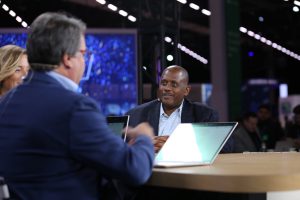 AI
AI
 AI
AI
 AI
AI
Artificial intelligence in personal computers isn’t an entirely new concept, but as the capabilities of this technology continue to expand, the potential uses of AI in PCs are captivating the attention and imagination of companies such as Dell Technologies Inc.
With AI as a workload, AI PCs can securely run AI workloads locally on the device without the need for cloud scaling, requiring nothing but an internet connection, according to Ed Ward (pictured), president of the Client Product Group at Dell.

Dell’s Ed Ward talks with theCUBE about AI PCs during Dell Technologies World 2024.
“What’s really different now is the ability to bring AI accelerators forward and things called NPUs, neural processing units, that really are dedicated for that,” he said. “Now you can get them in nice, thin systems … that allows you to really bring that capability locally on the device. That’s the big thing that’s different than now that can flow throughout the entire PC ecosystem, from the high end to the mid-range and beyond.”
Ward spoke with theCUBE Research’s John Furrier and Savannah Peterson at Dell Technologies World, during an exclusive broadcast on theCUBE, SiliconANGLE Media’s livestreaming studio. They discussed how AI PCs can transform workloads and the potential capabilities of AI PCs. (* Disclosure below.)
The potential capabilities of AI-powered PCs are incredibly exciting, offering transformative changes in how people manage both their professional tasks and personal activities. By integrating advanced AI technology, these PCs are set to revolutionize daily routines and enhance overall productivity in unprecedented ways, according to Ward.
“My wife’s like, ‘Hey, I’m looking for that photo that we took on the vacation. I can’t quite remember what folder I shoved it in. Where’d it go?’ And, the really cool thing in the AI PC is now with some of the capabilities it has, you can simply ask it to find that photo: ‘Hey, there was a person in there with a red car by a lake,’ and up pops a few photos,” Ward explained. “And that’s what I was looking for as opposed to really going through it.”
One of the biggest challenges faced when integrating AI into anything is storing and generating data. With such massive amounts of data required to power AI, it prompted a need for faster storage and data generation.
“A lot of the data is generated on the edge locally,” Ward said. “Bringing it now down locally where we have that capability to process that data where it’s generated real time, so less latency, better security and you can get the real time insights that you need to really be able to take effect.”
Here’s the complete video interview, part of SiliconANGLE’s and theCUBE Research’s coverage of Dell Technologies World:
(* Disclosure: Dell Technologies Inc. sponsored this segment of theCUBE. Neither Dell nor other sponsors have editorial control over content on theCUBE or SiliconANGLE.)
Support our mission to keep content open and free by engaging with theCUBE community. Join theCUBE’s Alumni Trust Network, where technology leaders connect, share intelligence and create opportunities.
Founded by tech visionaries John Furrier and Dave Vellante, SiliconANGLE Media has built a dynamic ecosystem of industry-leading digital media brands that reach 15+ million elite tech professionals. Our new proprietary theCUBE AI Video Cloud is breaking ground in audience interaction, leveraging theCUBEai.com neural network to help technology companies make data-driven decisions and stay at the forefront of industry conversations.